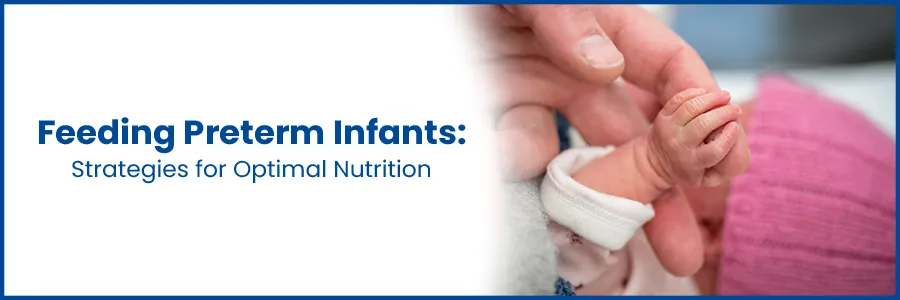Feeding Preterm Infants: Strategies for Optimal Nutrition

Every infant's journey into the world is unique, but for preterm infants, that journey often begins sooner than expected. Providing these tiny warriors with the best possible start requires careful attention to their nutritional needs. Nutrition plays a pivotal role in their growth, development, and overall well-being. In this article, we'll explore essential strategies for optimizing the nutrition of preterm infants, ensuring they receive the nourishment they require during their early days.
Understanding Preterm Infants and Nutrition
Preterm infants, born before completing 37 weeks of gestation, face distinct nutritional challenges due to their underdeveloped organs and systems. Nutrition during the neonatal period is critical for supporting rapid growth and promoting vital organ development. Proper nutrition also aids in building the infant's immune system and helping them catch up to their full-term peers.
Key Strategies for Optimal Nutrition
- Breast Milk: A Liquid Gold for Preterm Infants A vital source of nutrients is breast milk for all infants, especially preterm babies. It contains essential nutrients, growth factors, and antibodies that support immune function and gut health. Whenever possible, mothers are encouraged to provide their milk or use donor breast milk.
- Fortification for Growth Preterm infants often require extra calories, protein, and minerals to support their rapid growth. Breast milk fortification can enhance its nutritional content, ensuring that babies receive the necessary nutrients for optimal development.
- Balanced Enteral Nutrition Enteral nutrition, either through breastfeeding or formula feeding, is vital for preterm infants. A well-balanced mixture of macronutrients (proteins, fats, and carbohydrates) tailored to the infant's gestational age and weight helps meet their energy needs.
- Precision Parenteral Nutrition In cases where enteral feeding is not feasible, parenteral nutrition (IV nutrition) steps in. Healthcare professionals carefully calculate nutrient requirements to provide preterm infants with the right amount of nutrients, including vitamins and minerals, through intravenous methods.
- Individualized Feeding Plans Each preterm infant's nutritional needs are unique. Neonatal healthcare teams assess the infant's growth, weight, and health status to create personalized feeding plans that ensure optimal nutrition.
- Kangaroo Care: Love and Nourishment Kangaroo care, where the baby is held skin-to-skin against the parent's chest, offers emotional comfort and supports breastfeeding. It regulates the infant's body temperature, heart rate, and breathing, all of which contribute to better feeding experiences.
Overcoming Challenges
Feeding preterm infants can present challenges, including difficulties with sucking, swallowing, and coordinating breathing. Neonatal healthcare professionals work closely with parents to address these challenges and provide guidance on techniques such as paced bottle feeding or using breast milk through nasogastric tubes.
Conclusion:
Feeding preterm infants requires a delicate balance of science and compassion. By implementing strategies tailored to the unique needs of these tiny fighters, we can offer them the best chance for growth, development, and a healthy start in life. With optimal nutrition as their foundation, preterm infants can embark on a journey of resilience and strength as they thrive and flourish.
